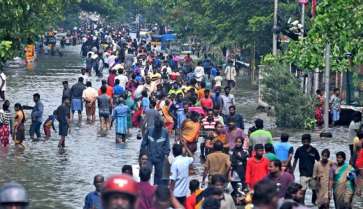Desperation in distress : On migration attempts by Indians to the developed world
The farming crisis is forcing youths to take to illegal migration
In a world where the movement of labour is curtailed and restricted, it is no surprise that people affected by distress in their homeland seek opportunities in the developed world despite the enormous risks during their journeys. The recent episode of the forced return of 303 Indians who were detained at a French airport is suspected to be another such instance , or worse, trafficking . About 20 of them sought asylum in France, while the rest returned to Mumbai on Tuesday. However, it is well-known now that an alarming number of Indians, nearly 1,00,000 and five times the number in the previous year, attempted to enter the U.S. between October 2022 and September this year, according to U.S. Customs and Border Protection data. More than half these attempts were through the heavily guarded Mexican border, with the rest being attempts to use the sparsely manned Canadian border. The rise of Indians risking the rather treacherous route to enter the U.S. through Mexico came to light when a six-year old girl from Punjab was found dead in the Arizona desert in June 2019. This was about nine months before the COVID-19 pandemic, which led the Trump Administration to invoke the rarely used Title 42 of the U.S. Code that deals-with public health, empowering border agencies to turn away asylum seekers even without a hearing . After the COVID-19 years and since the Biden Administration came to power, such migration attempts began to steadily rise again. That Indians are willing to take risks and bear enormous difficulties only to become illegal immigrants in the U.S. suggests that they are doing so either in desperation or are being misled.
Initial reports from the current incident also bear the tell-tale signs of what has been reported in the past about such cases — the majority of the air passengers were men from Punjab, Haryana and Gujarat; about a dozen were unaccompanied minors. Immediate reasons for such migrations have been cited by some Sikhs as alleged religious persecution, while others cited the distress in farming. Regardless of the reasons, it is time the Indian government paid attention to the trafficking racket that appears to be widespread especially across parts of rural Punjab and Haryana, where gullible people fall prey to tall promises of a better future in the U.S. Their situation has been exacerbated by the crisis that they face in farming with plummeting incomes and overexploited and fragmented farmlands. A crackdown on exploitative middlemen in the labour market can only be the beginning.
